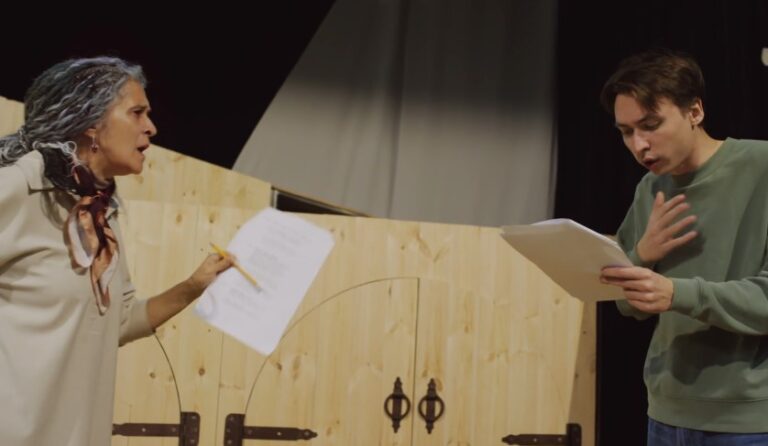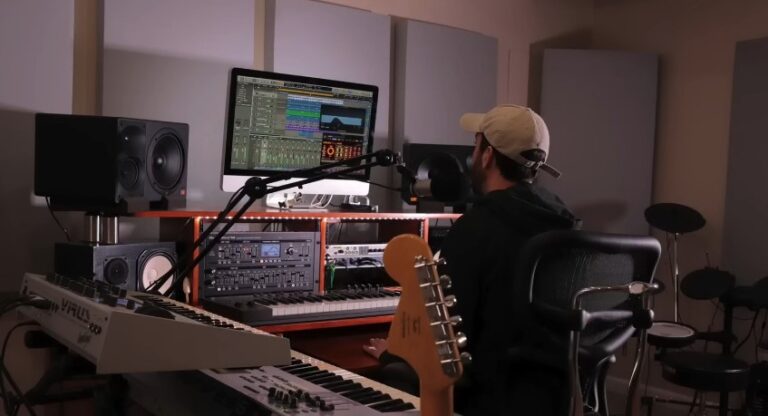Some musical keys have an almost mystical pull. They don’t just sound good—they feel like something deeper. D minor is one of those keys.
Often called the “saddest key” in Western music, it has a way of sinking into your bones, carrying emotions that range from sorrowful to defiant.
But D minor isn’t just about sadness. It’s dramatic.
It’s powerful. It’s the soundtrack to heartbreak, rebellion, and moments of sheer, overwhelming beauty.
From legendary classical compositions to modern rock anthems, countless artists have turned to this key to create something unforgettable.
Table of Contents
Toggle1. Mozart – Lacrimosa (Requiem)
Few compositions capture raw sorrow as perfectly as Lacrimosa. Part of Mozart’s Requiem, it’s grand, aching, and utterly haunting.
The choir swells like a storm rolling in, while the strings tremble beneath it, giving the piece a dramatic tension that never lets up.
There’s something poetic about the fact that Mozart never finished writing it himself—he passed away while working on the Requiem, leaving others to complete it.
Maybe that’s why it feels so unearthly as if the music itself is caught between this world and the next. If you ever need proof that music can reach straight into the soul, Lacrimosa is it.
2. Beethoven – Symphony No. 9 (Second Movement: Molto Vivace)
Beethoven’s Symphony No. 9 is best known for its triumphant Ode to Joy, but before that moment of celebration, there’s an explosion of energy in the second movement.
Written in D minor, Molto Vivace is fast, and almost aggressive. It’s like Beethoven was wrestling with something—chaos, frustration, the weight of his own deafness—and poured all of it into this relentless, driving rhythm.
There’s no room for sadness here. Instead, D minor takes on a rebellious edge, proving that this key isn’t just about sorrow; it’s about power.
3. Bach – Toccata and Fugue in D Minor
If there were ever a piece of music designed to sound larger than life, it’s Bach’s Toccata and Fugue in D Minor.
The moment those opening notes crash through an organ, it’s like stepping into a gothic cathedral where something mysterious is about to happen.
This piece has become the ultimate soundtrack for the eerie and dramatic, appearing in countless horror movies, haunted house attractions, and rock adaptations.
It’s theatrical, bold, and has a kind of dark elegance that makes it unforgettable.
Bach may not have written it with Halloween in mind, but the haunting beauty of D minor ensures that Toccata and Fugue will always feel a little supernatural.
4. Led Zeppelin – Stairway to Heaven
Few songs are as legendary as Stairway to Heaven. From its soft, intricate intro to its thunderous guitar solo, it’s a journey through every emotion music can offer.
What makes Stairway to Heaven special is its slow build. It starts off gentle and mysterious, like a story unfolding, then grows into something powerful and almost spiritual. By the time Jimmy Page lets loose with one of the most famous solos in rock history, the song is no longer just a ballad—it’s an anthem.
D minor plays a huge role in giving Stairway its dreamlike, otherworldly feel. It’s part of why, decades later, the song still feels as magical as the first time you heard it.
5. Metallica – The Unforgiven
Metallica has always had a way of blending intensity with melody, and The Unforgiven is one of their finest examples. It’s a song that balances delicate, emotional verses with heavy, crushing choruses—like a conversation between vulnerability and rage.
The D minor key brings out the pain in James Hetfield’s voice, making every lyric cut a little deeper.
It’s a song about regret, resentment, and the feeling of being trapped by your own past. When the guitar solo hits, it’s not just a technical masterpiece—it’s an emotional release.
The Unforgiven isn’t just another metal song; it’s one of those tracks that stays with you, echoing long after the final note.
6. Radiohead – No Surprises
If sadness had a lullaby, it might sound like No Surprises.
With its gentle glockenspiel, soft vocals, and whisper-like delivery, the song feels deceptively calm.
But beneath that lullaby-like exterior lies a deep exhaustion—a kind of quiet despair that makes the song so powerful.
D minor plays a crucial role in shaping its mood. It gives No Surprises a weightless, floating feeling as if it exists in a space between hope and resignation. It’s beautiful, melancholic, and haunting in the way only a Radiohead song can be.
7. The Rolling Stones – Paint It Black
Some songs don’t just express sadness—they scream it. Paint It Black is one of them.
From the opening sitar riff, there’s a frantic energy to it, like someone spiraling into darkness and desperately trying to claw their way back out. Mick Jagger’s vocals are urgent, almost panicked, and the relentless rhythm gives the song an unstoppable momentum.
D minor helps create that tension, making Paint It Black feel both hypnotic and unsettling. It’s not just about sadness—it’s about obsession, grief, and the feeling that the world is slipping through your fingers.
8. Evanescence – My Immortal
Few songs capture heartbreak quite like My Immortal.
Amy Lee’s voice floats over a simple piano melody, delicate yet filled with pain. It’s the kind of song that doesn’t just make you sad—it makes you feel sadness on a level you didn’t think was possible.
D minor is the perfect home for a song like this. It allows the melody to be soft yet devastating, beautiful yet completely shattering.
By the time the full band kicks in, the emotional weight becomes almost unbearable.
For anyone who’s ever felt like they were drowning in memories, My Immortal understands in a way that few songs do.
9. Hans Zimmer – Time (Inception Soundtrack)
Hans Zimmer knows how to make music that stays with you. Time, from the Inception soundtrack, is proof of that.
It starts simply—just a few quiet piano notes—but slowly builds into something massive.
By the time the full orchestra swells, the song feels almost too big to contain, carrying a mix of longing, nostalgia, and deep emotional weight.
D minor gives Time its haunting, cinematic quality. Even without the film’s context, it tells a story.
It’s not just background music—it’s the kind of composition that makes you stop and listen.
10. Billie Eilish – When the Party’s Over
Billie Eilish has mastered the art of making silence just as powerful as sound.
When the Party’s Over is quiet, stripped down, and deeply personal. The D minor key gives it a kind of weightlessness, making every pause, every breath, feel just as important as the notes themselves.
Her voice is barely above a whisper, yet the emotion is undeniable. It’s a song that captures heartbreak in its rawest form—not just sadness, but exhaustion.
The kind of hurt that lingers long after the moment has passed.
Final Thoughts
D minor isn’t just about sadness—it’s about intensity, drama, and pure emotion.
From classical masterpieces to rock anthems, it has given life to some of the most unforgettable music ever written.
If you’ve ever played Classico by Tenacious D on guitar, you know how powerful D minor can feel.
Some of these songs whisper. Some scream. All of them leave a mark.
Do you have a favorite D minor song that deserves a mention? Let’s talk about it!
Related Posts:
- 42 Most Famous Songs in A Minor Key - A Comprehensive List
- 10 Top Tracks in C Minor - A Journey Through Music's…
- 10 Easy Taylor Swift Songs for Beginner Guitarists
- Wait, Haven’t I Heard This Before? Songs That Sound the Same
- 10 Of The GREATEST Instrumental Guitar Songs Of All Time!
- Top 10 Most Complex Guitar Songs Ever Recorded








